Studying Computers & Graphic Design, Bahamian/Jamaican 🇧🇸🇯🇲
Last active 2 hours ago
Don't wanna be here? Send us removal request.
Photo






Fujioka Haruhi ☆ part .3
871 notes
·
View notes
Text
A bit worried for Ragatha and her future
So like did anyone else notice ragatha glitching a bit when she apologises to jax? Like it was hard to see but her hair glitched a bit and that worries me for her future because that doesn’t seem like a good sign, i fear she may abstract or this is a sign of something else
69 notes
·
View notes
Text
Doodle

1K notes
·
View notes
Text
Doodle

1K notes
·
View notes
Text

Carrying on from their brief conversation in the previous episode, there are multiple instances where Pomni and Jax genuinely get along with each other, with Jax being more open and vulnerable than he usually is around her and Pomni making a genuine attempt to understand him in "Untitled".

During the bartending segment of the adventure, while Jax pokes fun at Zooble, he legitimately asks Pomni about what she did prior to ending up in the Digital Circus. Beyond some friendly snark, he doesn't mock her for being an accountant or for the urban exploration (and recording of said exploration) that she did on her off-time.


Also during softball, the group voted to put Jax in a maid uniform, much to his displeasure. However, Pomni is notably the only one besides Jax to vote against doing it. Throughout the softball game, Jax and Pomni can be seen casually talking, and at the end Pomni even smiles and laughs at his antics. As much of a jerk as Jax can be, it's still nice to know that he may now have a friend that can see him as more than just that.




When Jax's original self reemerges and starts devouring the Evil Jax, Ragatha and Pomni are left bewildered. But Pomni's reaction changes to laughter at Jax's behavior, which catches Ragatha's attention, leading to an awkward moment as Pomni averts her gaze while Ragatha stares at the jester in disbelief.
At the end of episode, Jax, rather casually, offers to show Pomni something in the hallway that he suggested earlier, which she actually takes him up on.
#tadc#the amazing digital circus#tadc jax#tadc ragatha#tadc pomni#jax#pomni#untitled#softball#jax the amazing digital circus#the amazing digital circus pomni#amazing digital circus#funnybunny#tadc episode 5
888 notes
·
View notes
Text




Ragatha drops some lore on where she grew up, and what her family was like. And by her own admission, her mother was...well..."a lot". Enough that Ragatha gets visibly shaken when talking about her.
Ragatha: I'm sure she doesn't miss me. I certainly don't miss the yelling...and the berating...and guilt-tripping...and the...[quickly downs her drink and laughs unconvincingly]'' Yeah. Just kind of a farm girl. Nothing too out of the ordinary.
Notice that unlike all the others (Jax included), Ragatha is never asked to talk about her life, she’s the one who brings the subject on the table. You can feel she’s craving to be opened about her true feelings to someone, but because everyone else sees her as the "happy-go-lucky" one, they don’t even bother asking, and after she talks too much, she brushes it off like if she did something wrong.


Take note of Jax's reaction after hearing Ragatha’s story. He doesn't tease her about any of this, like he did with Zooble's own past. He just quietly studies his own drink, as if he recognizes that this is a sore spot for Ragatha and doesn't want to mock her over it.
It's hard to not feel bad for Ragatha after what happens throughout the episode: After the series of adventures, the other Circus members all go hang out with each other, with Gangle, Zooble, and Kinger together, and Pomni and Jax starting to bond with each other, leaving Ragatha all alone. Because Ragatha embodies toxic positivity to the point where the others are uncomfortable around her due to finding her positivity to be annoying or insincere, combined with how she desperately craves love and affection from the others around her, this scene shows that deep down, Ragatha doesn't have any true friends.
#the amazing digital circus#tadc#tadc jax#tadc ragatha#ragatha#untitled#gangle the amazing digital circus#the amazing digital circus ragatha#cw abuse#tadc episode 5
630 notes
·
View notes
Text
Disney’s treatment of Bobby Driscoll
I am absolutely seething about what Disney just did to Bobby Driscoll again 54 years after he was buried a John Doe (his corpse was found by two children playing in an abandoned tenement building–his death date is actually unknown and the date given is the day he was instead found) in an unmarked mass grave in Hart Island’s potter’s field (not identified for a year until his mother pressured Roy O. Disney to make the NYPD care enough to match his fingerprints) where he still is surrounded by prisoners and unidentified vagrants (literally referred to as the “poor, unable and unwanted” on a sign)…
And 69 years after they fired him by letting him read it in a gossip column. Walt had his secretary call security on him and he was thrown out of the building crying at 16 years old (near his birthday–he was 14-15 during Peter Pan’s production). The film was #1 at the box office and in release for several weeks when he was fired. There’s also a rumor that Howard Hughes was pressuring the firing, as he absolutely loathed child actors in general, and was in charge of RKO.
Bobby was the voice and rotoscoped character model for the titular Peter Pan. He was also in Song of the South, Melody Time, So Dear to My Heart and Treasure Island. His live-action movies literally saved the Disney company from total bankruptcy in the ‘40s. He was the very first actor ever signed to the company. He was only one of twelve child actors to ever receive a Juvenile Oscar (with such company as Judy Garland, Mickey Rooney, Shirley Temple, Margaret O'Brien and Hayley Mills) for his performances in 1948/9’s The Window and So Dear to My Heart. And for the record, Walt didn’t treat Adriana Caselotti (Snow White) much better, to the point where he denied her the ability to get work with her voice ever again. It’s just that Bobby is possibly the most horrific ending of a child actor ever in Disney’s history (there are many).
Disney just made Peter Pan the villain in the new Chip 'n Dale abortion that gives the animated character Bobby’s actual backstory (this is not an evil Peter Pan take based on the book and not in any way comparable to Once Upon a Time!) of being an actor fired for hitting puberty and having acne. That’s not Peter’s backstory; that’s Bobby’s. And it’s too specific to be a coincidence. They drew a character, who was drawn unmistakably with the actor’s real features and acting performance, as a fat, middle-aged man, despite the fact that he died at 31 and Peter’s voice basically was his post-pubescent adult voice. They made him a hideous monster aged far past an age he ever reached.
The film also ends with the character incarcerated, which happens to be yet another thing from the man’s real life. By his own words, he was raped in prison. His spiral on drugs sent him to Chino, which didn’t happen until he was bullied mercilessly in public school after being pulled from the child actors’ school (he had stage parents who beat him and locked him in a closet to the point that Disney had earlier stepped in to send him to live with costar Luana Patten’s family as a child–there are also allegations he was molested while working at Disney) when Disney basically ended any chance of steady work. He was a straight-A student prior.
I’ve been telling this story every chance I’ve gotten for nearly two decades. Few today know who he is, because Disney does everything to keep the story hidden and him forgotten. Bobby is not a Disney Legend, despite fans lobbying for decades. The Peter Pan DVD/Blu-ray avoids mentioning him as much as they can. Another one of his films is de facto banned.
That Disney just pulled this with a disgusting, sick joke that laughs at his backstory and misfortune, then turns him into an irredeemable villain in a plot that essentially turns themselves into the victims of copyright theft (they’re responsible for lobbying to get copyright law extended indefinitely). So, in other words, Disney has framed themselves as the victim of a heartlessly-fired child actor who died tragically instead of the villain and framed themselves as the victim yet again.
If there’s any silver lining, it’s that Twitter and social media just learned about him for the first time because of outrage over Disney spitting on this dead man’s unmarked grave yet again. I knew this story decades ago (I had a Peter Pan obsession). Undoubtedly, nobody working on this stupid film was with the company 70 years ago and most were likely not even alive when he died, but somebody there had the bright idea to put the biographical data of a person Disney has spent decades trying to make everyone forget as a villain origin story.
“I have found that memories are not very useful. I was carried on a silver platter and then dumped into the garbage can.” -Bobby Driscoll
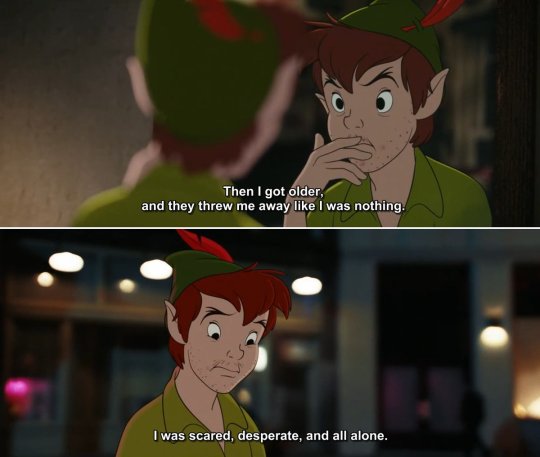
youtube
youtube
#bobby driscoll#peter pan#walt disney#disney#chip 'n dale#chip 'n dale: rescue rangers#rescue rangers#song of the south#melody time#so dear to my heart
8K notes
·
View notes
Text
Disney’s treatment of Bobby Driscoll
I am absolutely seething about what Disney just did to Bobby Driscoll again 54 years after he was buried a John Doe (his corpse was found by two children playing an abandoned tenement building–his death date is actually unknown and the date given is the day he was instead found) in an unmarked mass grave in Hart Island’s potters field (not identified for a year until his mother pressured Roy O. Disney to make the NYPD care enough to match his fingerprints) where he still is surrounded by prisoners and unidentified vagrants (literally referred to as the “poor, unable and unwanted” on a sign)…
And 69 years after they fired him by letting him read it in a gossip column. Walt had his secretary call security on him and he was thrown out of the building crying at 16 years old (near his birthday–he was 14-15 during Peter Pan’s production). The film was #1 at the box office and in release for two weeks when he was fired. There’s also a rumor that Howard Hughes was also pressuring the firing, as he absolutely loathed child actors in general, and was in charge of RKO.
Bobby was the voice and rotoscoped character model for the titular Peter Pan. He was also in Song of the South, Melody Time, So Dear to My Heart and Treasure Island. His live-action movies literally saved the Disney company from total bankruptcy in the ‘40s. He was the very first actor ever signed to the company. He was only one of twelve child actors to ever receive a Juvenile Oscar (with such company as Judy Garland, Mickey Rooney, Shirley Temple, Margaret O'Brien and Hayley Mills) for his performances in 1948/9’s The Window and So Dear to My Heart. And for the record, Walt didn’t treat Adriana Caselotti (Snow White) much better, to the point where he denied her the ability to ever get work with her voice ever again. It’s just that Bobby is possibly the most horrific ending of a child actor ever in Disney’s history (there are many).
Disney just made Peter Pan the villain in the new Chip ‘n Dale abortion that gives the animated character Bobby’s actual backstory (this is not an evil Peter Pan take based on the book and not in any way comparable to Once Upon a Time!) of being an actor fired for hitting puberty and having acne. That’s not Peter’s backstory; that’s Bobby’s. And it’s too specific to be a coincidence. They drew a character, who was drawn unmistakably with the actor’s real features and acting performance, as a middle-aged, fat man, despite the fact that he died at 31 and Peter’s voice basically was his post-pubescent adult voice. They made him a hideous monster aged far past an age he ever reached.
The film also ends with the character incarcerated, which happens to be yet another thing from the man’s real life. By his own words, he was raped in prison. His spiral on drugs sent him to Chino, which didn’t happen until he was bullied mercilessly in public school after being pulled from the actor kids’ school (he also had stage parents who beat him and locked him in a closet to the point that Disney had earlier stepped in to send him to live with costar Luana Patten’s family as a child–there are also allegations he was molested while working at Disney) when Disney basically ended any chance of steady work. He was a straight-A student prior.
I’ve been telling this story every chance I’ve gotten for nearly two decades. Few today know who he is, because Disney does everything to keep the story hidden and him forgotten. Bobby is not a Disney Legend, despite fans lobbying for decades. The Peter Pan DVD/Blu-ray avoids mentioning him as much as they can. Another one of his films is de facto banned.
That Disney just pulled this with a disgusting, sick joke that laughs at his backstory and misfortune, then turns him into an irredeemable villain in a plot that essentially turns themselves into the victims of copyright theft (they’re responsible for lobbying to get copyright law extended indefinitely). So, in other words, Disney has framed themselves as the victim of a heartlessly-fired child actor who died tragically instead of the villain and framed themselves as the victim yet again.
If there’s any silver lining, it’s that Twitter and social media just learned about him for the first time because of outrage over Disney spitting on this dead man’s unmarked grave yet again. I knew this story decades ago (I had a Peter Pan obsession). Undoubtedly, nobody working on this stupid film was with the company 70 years ago and most were likely not even alive when he died, but somebody there had the bright idea to put the biographical data of a person Disney has spent decades trying to make everyone forget as a villain origin story.
“I have found that memories are not very useful. I was carried on a silver platter and then dumped into the garbage can.” -Bobby Driscoll

youtube
youtube
8K notes
·
View notes
Text









opposites!!
@gooseworx
#the amazing digital circus#tadc#opposite au#pomni#jax#kinger#kaufmo#caine#ragatha#gangle#zooble#bubble#tadc fanart
14K notes
·
View notes
Text
"Why Can't you Be Nice?"
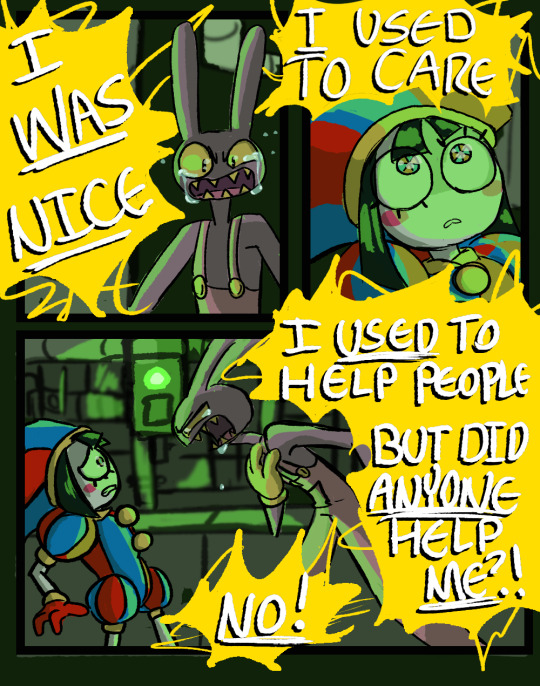
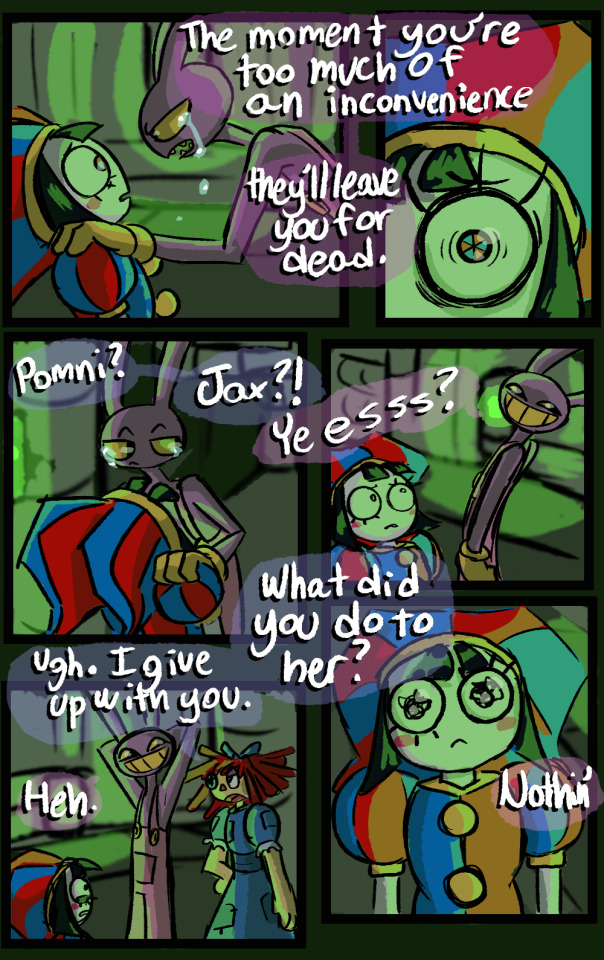
#tadc jax#the amazing digital circus#tadc pomni#tadc fanart#funnybunny#pomni x jax#tadc#tadc ragatha
4K notes
·
View notes
Text
Someone had a question about their other clothes besides the ones they train with..



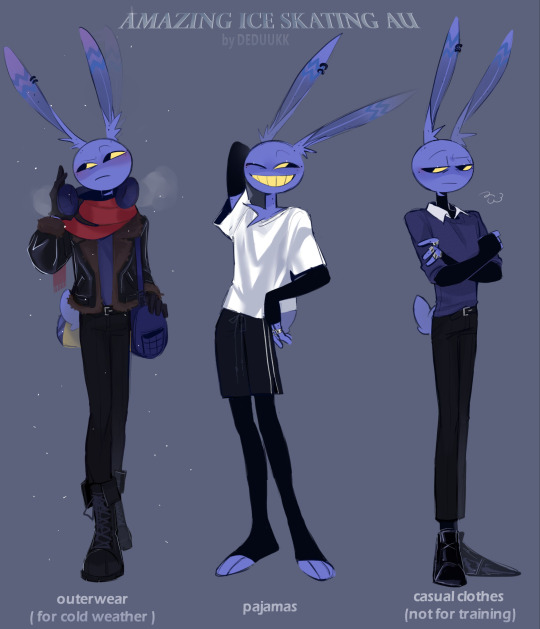
I'm running away on business again 🤸♀️
10K notes
·
View notes
Text
Someone had a question about their other clothes besides the ones they train with..




I'm running away on business again 🤸♀️
10K notes
·
View notes
Text


Stolas attempts modern slang by zerna on twitter
3K notes
·
View notes
Text
A Stupidly Long Oikawa Analysis
The main issue with Oikawa is that he's not naturally gifted, which is emphasized a lot in the show. For example, the last episode of the season one match of Karasuno vs Seijoh was named "Oikawa Tooru is not a Genius". Despite that, he's still the best player on Seijoh, and is highly respected by his teammates as a setter and their captain. Due to not having any natural skill or technique, Oikawa resorted to compensating with his own tactics. He knew that, no matter how hard he tried, he would never have the same technical skill as a genius like Kageyama. Instead, he used his own skills in analysis and communication to bring out the best in his spikers.
This is why, despite being called Grand King, Oikawa is depicted as a mighty general. He leads his soldiers, and in return, they trust him with their lives and fight with him. The amazing thing about Oikawa's leadership is that his teammates trust him because they know he can lead them. They understand that Oikawa has honed their skills and improved them all as players. He's helped them all, and when a game comes, they understand that all he asks of them is to keep trusting him. Trust that he'll send them a good toss, trust the strategies he'll formulate, trust his leadership.
At the end of the day, Oikawa knows he doesn't have the technical skill of a genius, so he dedicates his focus to improving his whole team. The origin of this focus would probably come from the episode where he almost backhands Kageyama in middle school. Iwaizumi intervenes and literally knocks some sense into him. They fight and yell, but then Iwaizumi tells Oikawa, "There are six people on court! The team with the best six players is the best!" Oikawa seems to have an epiphany then. He seems to realize exactly what his best friend is saying. It seems very straightforward at first, but it clearly not all that simple. Oikawa thought that he had to improve himself as a setter so he could carry his team to victory. He was trying to be a king. Luckily, he had Iwaizumi to cut off that train of thought very early on.
I loved how the show compared what Iwaizumi said to multiplication and addition. Oikawa thought that he had to improve himself because he thought you just mushed together the strengths of each player. That's wrong. He learned that you multiply the strengths of each player instead. It took me a bit to understand that one too. The way I look at that, it means that each player will affect one another when in a team. They can't just play as individuals that happen to be on the same side of the court. By trying to add the powers of your team, you just stack them on top of each other. By multiplying, you take what you already have and make it greater by merging it with something else.
If you like visuals, think of oil and water vs baking soda and vinegar. Adding oil to water increases the overall volume of liquid, but they never combine. If there is a cup of water and a cup of oil, you get two cups of liquid. Baking soda and vinegar doesn't just stack; it explodes. If you have a cup of vinegar and a cup of baking soda, they'll make way more than two cups when they combine. The players get stronger when together.
So, Oikawa stops trying to become a king. He obviously does keep trying to improve as a player, but he starts to focus more on his spikers. He realizes that he can compensate for his lack of natural technical skill by using his own natural skill of reading people and adjusting his responses adequately. Oikawa is a versatile player, and a very flexible setter. He gives his energy to improve his team, and they respond by giving their energy to get better and win. I found it interesting how loyal his teammates were to him. It brings me back to Oikawa being a general and not a king. Kageyama is high, untouchable, and barks out orders as the king, while Oikawa is the brave general who leads the soldiers. Oikawa fights alongside his soldiers. Kageyama stays in his palace, highly revered, but alone. The difference between them is that people are forced to follow Kageyama because of his unparalleled power. People follow Oikawa because they trust him with their life.
It's actually one of my favorite pieces of symbolism in Haikyuu. Kageyama was a genius from the beginning. His skill was something he was born with, and now he's king. When the eldest prince is born they have the birthright to become king. Kageyama got his title simply because he was lucky (
I love Kageyama, and I know he worked very hard, but he was mainly able to get there because he's a natural born genius. Generals have to rise through the ranks and work for their position. Some soldiers in history were actually more loyal to their general than to their king. Generals risk their lives with their soldiers. The king commands from the palace. The analogy doesn't really work for their relationship, but it's great for their individual characters.
As for Oikawa's relationship with Kageyama? It's complicated, as most things with Oikawa are. Oikawa is Kageyama's upperclassman, and It's evident that Kageyama once looked up to him. At first, I never understood why Oikawa hated Kageyama so much. It was fairly obvious that his underclassman basically worshipped him, and I thought it would do wonders for his ego. However, it seems so much more obvious after a bit of rewatching. Middle school Kageyama was a natural from the start, and middle school Oikawa was just a mess of overworking, burning out, and crippling insecurity masked by egoism.
Oikawa hated that he worked himself to death to make the cut, then some random bright eyed prodigy first year just comes in and steals the show. Maybe it wasn't reasonable to hate him so much, but middle schoolers aren't reasonable. Some people say Oikawa was supposed act more mature and responsible, an that he should have had more self control with his feelings. They seem to forget he was a CHILD. He was a literal child; he just entered adolescence, and he was still learning. He shouldn't be expected to handle things like an adult when he isn't one. Oikawa was just SCARED. He loved volleyball and didn't want to be replaced by Kageyama. He overworked himself so he wouldn't be dispensable. I agree that he should not have tried to hit Kageyama. However, you can't say that it makes him a bad person or character.
Oikawa wasn't really in his right mind at the time. It was clear that he was in the middle of an adrenaline rush of sorts from overworking himself. He was visibly agitated and overwhelmed, but, Kageyama approached him. This isn't Kageyama's fault either. While I do think he should have been able to tell it was a bad time to ask, Kageyama was an even younger child. He was never good at reading people either, so Kageyama can't be held accountable. Imagine, though, how Oikawa felt. He was in the middle of training so he wouldn't be replaced, and who decides to interrupt? The person he's trying not to be replaced by. Again, not Kageyama's fault, but you must understand that Oikawa was afraid. He was stuck in this swarm of negative thinking, and the very source of so much of his fear and insecurity was suddenly right in front of him. It wasn't right of him to do that, but you can understand why he did it.
That's another very interesting part of Oikawa. It was his worst fear come to life when he was subbed out for Kageyama in one of their games. It was too much for him, and he just finally snapped. Thankfully, Iwaizumi's lecture struck a chord in him, and he made an apparent effort to remember it. However, I don't think it made his fear go away. In fact, I think his fear of being replaced originated much before middle school. Obviously, I have no idea when exactly, but I would have to guess it started around the middle of elementary school at the latest. This is mainly because I believe Oikawa's obnoxious personality is a sort of defense mechanism used against this fear. Oikawa is objectively very good-looking, flamboyant and charming; he's also very popular among girls.
I found it very interesting that he was portrayed to be a heartthrob by the media, but was seen to be very immature and honestly quite annoying. Around his friends he acts very childish, but switches again to his charming persona when around fans or other classmates. It was fairly clear that something wasn't right. I wanted to believe it was just inconsistent writing, but one of Furudate's greatest strengths is building characters; I also saw no clear consistency problems with other characters. I believe that Oikawa switches personas depending on what reputation he's trying to uphold. We know Oikawa is insecure at heart, and we see him trying to play it off by being prideful.
If we go back to his fear of being replaced, I find reasonable to believe that Oikawa acts the way he does so that people don't get bored of him. He wants a reputation, because that means people will know about him. Something that is consistent about his personas is that he's very sociable in both. He's childish, loud, and constantly wants attention, or he's always laughing, flirting, and joking. It's almost as if he believes that everybody will find someone new if he doesn't remind them he's still there. He thinks people will get bored of him, so he constantly tries to make sure people stay interested. A lot of people say that Oikawa is too annoying and narcissistic, but he does it because he's afraid people will get rid of him if he doesn't keep their attention.
That also leads to another major part of Oikawa's character. I actually believe this may be the biggest part of his overall character. There's something that sets Oikawa apart from every other character. Regardless of if you like him or not, you can't deny that there's an energy about him that's just different. He's the closest you'll get to an antagonist in Haikyuu, but you also get to see his soft sides. We see the love he has for volleyball and for his teammates. It's strange to see so many different sides of a character. It's also interesting how Ushijima wanted Oikawa join Shiratorizawa. It's understandable, considering Kageyama still hadn't developed and Oikawa was the best setter in the prefecture.
So, the question I always wanted to answer: Why didn't Oikawa go to Shiratorizawa? Yes, the fandom exaggerates it and loves to joke about it, but it was a real question for me at first. Oikawa wanted to go to Nationals, and joining Shiratorizawa would have guaranteed it. Best ace and best setter in the entire prefecture on one team? They would blow the competition away. It would have been much easier if Oikawa had indeed swallowed his pride and joined Shiratorizawa. However, it seems that it wasn't necessarily about all about "worthless pride". Of course it was a factor, but Oikawa wouldn't let his pride get in the way of his dreams; he's smarter than that.
It was then that I started to notice a recurring pattern with Oikawa. He's a direct opposition to the main characters. He refused to join a powerhouse team for an easy ticket to Nationals. He uses his personal strengths to improve instead of being upset over what he doesn't have. Oikawa is an incredibly unique character because of his sheer will to do things the way he wants. Oikawa is a setter; he's a control freak, but in a less direct way than Kageyama. He doesn't force everyone to adapt to him, yelling, "You better follow me!" Rather, he goes his own way and says, "Follow me if you dare."
He carves his own path, regardless of what others say. Seijoh was destined to lose from the beginning. Furudate loves symbolism in Haikyuu. Notice how every national level school is represented by an animal? The mighty eagle of Shiratorizawa, the wild crow of Karasuno, the clever cat of Nekoma, the soaring owl of Fukurodani? What does Aoba Johsai have? A castle. Aoba Johsai translates to Blue Castle. While the other teams fight, jump, and soar, Aoba Johsai is beautiful, strong, and reliable, but they will never fly. It was almost as if Oikawa went to Aoba Johsai simply to prove he didn't need Ushijima to go to Nationals. Looking at it like that, it indeed makes it look like Oikawa refuses to go to Shiratorizawa out of pride. However, I like to see it as more than that.
First of all, Oikawa's greatest wish was to defeat Shiratorizawa in order to go to Nationals. OIKAWA DOES NOT SETTLE. He refuses to settle for only half his dream. Maybe it's too prideful, but it would invalidate the years of hell he put himself through trying to accomplish it. It was like Ushijima was telling him, "Hey, you tried your best, didn't you? You can't beat me, and all your years of work are for nothing. Just join us and give it up." It was insulting to him. Oikawa's sheer perseverance was what got him where he was. He took everything the world threw at him and threw it right back. Suddenly, it all stops and he's offered an olive branch of sorts. The world doesn't offer everything he wants, but it's something. Just enough to get him to stop fighting back.
Oikawa wants all or nothing when it comes to his passions. It's risky, maybe not a very smart decision, but that's just who he is.He doesn't want the olive branch; he wants the whole damn tree. Oikawa wants to look at Ushijima, to scream from the top of the world, and tell everybody who didn't think he could make it, "I DON'T NEED YOU." He wants to show people they were wrong. No, he's not a genius, but he doesn't need to be one. He wants to follow his dreams his own way or he doesn't want it at all.
Second of all, Oikawa wanted to go to Nationals with Iwaizumi. Oikawa and Iwaizumi were together their entire lives. They played, they laughed, they cried, they won, they lost, but they were always together. Oikawa needs Iwaizumi specifically because he trusts that he'll never be dispensable to his best friend. Iwaizumi is his support, the way he grounds himself when things are too much. Oikawa and Iwaizumi want to go to Nationals together. It's not some fantasy they conjured up; it's their childhood dream. Oikawa wouldn't be willing to let go of that. Again, Oikawa refuses to settle. He wants to lead a team to Nationals with his partner, or he doesn't want it at all.
Oikawa was willing to risk everything. He wanted to go all in. Maybe it was wrong, and maybe it was just worthless pride. Regardless, it shows us his unparalleled passion for the sport. He deserved so much better than what he got, but life isn't fair. Haikyuu shows us that. It's almost discouraging to see Oikawa lose. If you look at it, between Oikawa and Kageyama, Oikawa is actually the underdog. Kageyama is the genius player and Oikawa just tries his best. Haikyuu is an underdog story, but sometimes the roles are not as we think.
(⚠️!!SPOILERS FOR THE LAST CHAPTER!!⚠️)
When Oikawa is seen as the "final boss" as the official setter of Argentina's Olympic team, it's the cherry on top to confirm what type of character he is. THIS MAN WAS SO DAMN PETTY AND DETERMINED TO FOLLOW HIS DREAMS THAT HE IMMIGRATED TO A DIFFERENT HEMISPHERE. He was so determined to make his own path that he made a name for himself on the other side of the world. He was virtually unknown, and had to start from scratch all again. What happened? He actually did it, and now he's the main focus of his team. I have such a ridiculous amount of respect for Oikawa. The determination that man has is unparalleled.
I believe Furidate also uses Oikawa as a model to teach us that, yes, it's discouraging to be surrounded by people better than you, and failure is inevitable. However, it you can use those failures as a lesson to improve yourself, and if you stick to your goals until the very end, the world will get tired and it'll work out in the end. Oikawa tells us that it's okay to be bold; he tells us to understand that it takes time to succeed, and you will succeed. He tells us to treasure those who support us, because the trust they have in you is more than you could ever know. In the end, Oikawa really accomplishes his dreams. Maybe Iwaizumi isn't with him, but Oikawa has learned by then how to live without him and vice versa. Instead, he gets to fulfill his promise of defeating him when they face each other.
Oikawa never got to go Nationals, but now he's at Internationals. Now he finally gets to beat Ushijima, Kageyama, and Iwaizumi all in one spot. We don't even get to see the result of the match, which is actually something I love. Oikawa is the only one we know in Argentina; it would be unrealistic to try to decide a winner between the two teams if we don't know the strengths and weaknesses of each player. Regardless, we finally get to see Oikawa get what he deserves. Maybe it will work out for him, and maybe it won't. Something amazing about leaving an open ending is that we get to analyze the characters as we please, and we get to imagine what happens ourselves. It's actually one of Furudate's best pieces of symbolism in the whole series.
Their stories are not over yet. Maybe Oikawa loses again, but he keeps going. Maybe he finally throws the towel. Who knows? Characters are ever changing, but I believe Oikawa will stick to it. Then again, maybe his knee injury will force him to quit. Life is unpredictable, but Oikawa's determination has been constant throughout the whole show. The way he grew as a person, a player, and leader, just enraptured me to no end. Oikawa is one of the most fascinating characters I've ever come across. I don't like picking favorite characters, but I genuinely believe Oikawa is the most well written and complex.
That concludes my 3,000+ word rant/essay about the wonderful anomaly that is Tooru Oikawa. Honestly, there's definitely more that I forgot to incorporate or have not thought of, but this is what I have!! Thank you for reading through all that?? Also, I'm not going to go through that and edit it, so feel free to comment if anything makes no sense :)
#anime#haikyuu!!#aoba johsai#seijoh#haikyuu fandom#oikawa torū#haikyuu oikawa#oikawa tooru#oikawa#tooru oikawa#torū oikawa#haikyuu oikawa tooru#haikyuu iwaoi#haikyuu iwaizumi#analysis#fictional characters#character study#character analysis
499 notes
·
View notes
Text







Regarding Octavia's song I Will Be Okay:
The line "I'll just get older and you'll only know my name" implies that Stolas had trouble keeping up with her interests when he began his affair with Blitzø. Now that he's estranged from her for the entirety of his sentence, he has no way of finding out what she’s doing or who she's becoming unless some news about her gets out to Hell’s general public. When he reclaims his crown in a hundred years, the daughter he knew at the start of his banishment will be a distant memory, replaced by a stranger he won’t even recognize or know anything about except her name and the fact she was once his beloved child.
Stolas realizes the inverse of this too, mournfully telling Blitzø that he’ll be a stranger to her by the time he's allowed to regain his title. Why? Because his experiences during his century living as a commoner will inevitably shape him into a different person than he was before his banishment, meaning that all she’ll know about him is his name.
Nearing the end of the song, the scene begins a cataclysm of meteors showering from above and the ground exploding beneath her. Back in the episode "Loo Loo Land", she listens to a song called "My World Is Burning Down Around Me" by 'F*ck You, Dad' (the band) while her mom Stella is screaming at her dad Stolas about the affair with the imp Blitzø. The song title serves as a pun that her dad has supposedly ruined the family structure and she doesn't feel comfortable at home anymore and, when they reconcile at the theme park, Blitzø's fight with Robo Fizz results in the place burning down around them on their way out. Stolas tries to keep her world together that is their own relationship as father and daughter. Unfortunately, that falls apart in "Mastermind", which Stolas was willing to die for his lover after he previously promised to "never leave her". Her song tells how she's questioning if her dad's love ever existed. Now that he has left, her world is now burning down around her with no one to support it and she contemplates carrying on in her life without him. It takes a look at the box of her father's antidepressants before she decides to unironically say "F*ck you, dad" without actually saying it by the end of this episode, misguided as it is without knowing the additional context of those pills.
When Octavia asks Stolas if she was just an obligation to him, it hits harder when you remember that she actually was since it is usually a parent's duty to raise their child. On the political and aristocratic side, Stolas and Stella were arranged for the sole purpose of birthing her as a precautionary heir. As her father of that family, it's his obligation to raise her enough to be worthy of his legacy. When he saw how precious she turned out to be, it gave him a new sense duty out of love to raise her less as an heir and more as his pride and joy of a daughter.
The scene where Octavia decides to leave Stolas - it wasn’t because she hated him, or even Stella and Andrealphus’ manipulations. It was because she believes it’s her fault that Stolas is so miserable that he had to take antidepressants, and that he stayed in a miserable marriage purely out of obligation towards her. Octavia believes it’s better that Stolas be with Blitzø and be happy for once, which was why she also asked beforehand if it's why Stolas didn't hesitate when the chance to "leave" her appeared.
There is the fact that Octavia accused Stolas of choosing Blitzø over her sounds like jealousy, but then there were all of his efforts to protect her and make her happy over the years before the series began. Especially in "Loo Loo Land", none of the imps who attacked Stolas ever connected Octavia as his daughter because he was the bigger target. What's more, when they are alone, the prince is shown capable of protecting them both. With portraits in the mansion of them both being happy, it is possible that there hasn't been a single moment so dangerous that it actually required Stolas to risk his own life for Via like how he did for Blitzø in "Mastermind", and hopes that will never happen. For all of his actions that drove them apart, it is shown in "Western Energy" how much he would still be willing to sacrifice his life to protect Via if he ever has to, just by threatening someone like Striker.
#vivziepop#helluva boss#stolas#ars goetia#octavia#stolas helluva#hb stolitz#stolas helluva boss#hb octavia#helluva boss octavia#octavia helluva boss#stolas and octavia#stolas and blitzo#character analysis#sinsmas#helluva spoilers#hb#hellaverse#character study#character angst
67 notes
·
View notes
Text

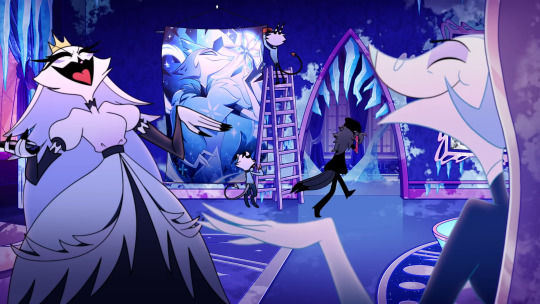
The way Andrealphus and Stella treat Octavia says everything you need to know about her current living arrangement. When Stella prevents Stolas from talking to Via, she laughs and mocks him by calling his attempts “hilarious”, not caring about how distraught Octavia is as a result. She even refers to her as his daughter, rather than our daughter or even using her name. Later in the episode, Andrealphus taunts Stolas for losing her in the same manner as his plants and stars - in his eyes, Octavia’s just another one of Stolas’ prized possessions that he managed to swindle him out of, and lords it over him.
#vivziepop#hazbin hotel#helluva boss#stolas#helluva boss stella#stella#hb octavia#helluva boss octavia#octavia helluva boss#stolas and octavia#octavia#andrealphus#hb andrealphus#hb stella#sinsmas#cw abuse#character study#character analysis
168 notes
·
View notes
Text








I have seen the last episode of Helluva boss again and....I found these photos😚😚
#helluva boss#vivziepop#stolas goetia#stolas helluva boss#helluva boss vivziepop#vivienne medrano#vivziepop helluva boss#helluva boss stolas#stolas#stolas helluva#helluva stolas#octavia helluva boss#helluva boss octavia#octavia goetia
3K notes
·
View notes